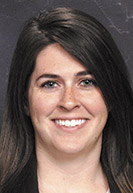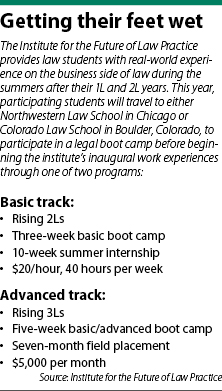Subscriber Benefit
As a subscriber you can listen to articles at work, in the car, or while you work out. Subscribe NowThe Great Recession and its aftermath left the legal profession reeling. Jobs were harder to come by, but the cost of law school continued to rise, leaving young lawyers searching for employment that would begin to pay down their often-massive debts.
The practice of law also shifted dramatically after the financial downturn, with traditional firm jobs — particularly associateships — declining, but in-house openings increasing. There was just one problem with that change: the path to in-house positions traditionally begins in law firms, meaning young attorneys found it increasingly difficult to find work in either space.
 Mooz
MoozTo Bill Mooz, the solution seemed straightforward: law schools needed to begin teaching skills that would enable their students to find in-house or other non-firms jobs right after graduation. But as Mooz surveyed the landscape of legal education, he realized academia was continuing to teach traditional law school curriculums in a modern world.
So, Mooz helped launch a new curriculum at the University of Colorado Law School designed to teach students the 21st century skills they need to succeed in the changing practice of law, with a particular focus on leveraging technology and project management practices to serve clients efficiently and effectively. Now, Colorado’s program has grown into the Institute for the Future of Law Practice, a nonprofit that teaches students about the business and practical side of law, including students from the Indiana University Maurer School of Law.
“Very little is being taught in law school that is relevant to the kind of practice demands on lawyers today,” said Bill Henderson, an IU Maurer professor who is helping lead the institute. “We were looking at how could we change that.”
 Henderson
HendersonNew dogs, new tricks
The original Colorado curriculum was taught through Silicon Flatirons Tech Lawyer Accelerator, an internship program allowing students to learn and practice the skills they’ll need in today’s legal market, such as legal economics and financial literacy, process management and automation, and contracting. The program also teaches students to think like in-house counsel or an alternative legal service provider so they can easily assimilate into jobs in the corporate realm.
Among TLA’s first corporate partners was Cisco, whose work with the program was led by vice president and deputy general counsel Steve Harmon. Harmon said he was attracted to TLA’s model because it can be difficult, expensive and time-consuming to retrain attorneys to think like in-house counsel once they’ve begun building their career at a law firm.
Harmon said there is a disconnect between the traditional billable hour model and the results-driven model that in-house counsel use. Law schools generally train students to work for firms, he said, which means students are taught to measure success in terms of input rather than output.
Michigan State University College of Law professor Dan Linna experienced that disconnect first-hand when he made the switch from IT to law. Linna’s 10 years in practice revealed attorneys weren’t using process improvement and project management technologies to increase their efficiency, but instead were operating similarly to how attorneys operated a century ago.
Henderson agreed that it’s difficult for lawyers to change the way they do their jobs once they’re acclimated to firm life, which is why he became interested in training law students to change the way they approach legal problems.
“We’re looking for a pipeline solution,” Henderson said.
From boot camp to duty
Creating a pipeline of law students who are trained for 21st century practice began by opening TLA up to other law schools, including IU Maurer. Then the American Bar Association lifted the ban on paid, for-credit field placements, making the TLA program more appealing to law students who were looking for opportunities to gain experience while also paying down their debts.
 Titsworth
TitsworthMooz and Henderson then decided to open the program up to the broader legal community, which led to the institute’s four-school collaboration between Colorado, Maurer, Northwestern Pritzker School of Law in Chicago and Osgoode Hall Law School in Toronto, Ontario. The institute will begin its inaugural work experiences this summer, sending 40 students to “boot camps” at either Colorado or Pritzker.
The boot camps are open to students during the summers after their 1L and 2L years and are based on similar intensive training sessions offered through TLA. Rebekah Titsworth is a Maurer 3L who participated in TLA the summer after her 1L year, when she went through a four-week boot camp experience.
Each week, Titsworth and her cohort spent four days learning about general legal business subject areas, such as using contract management or document automation systems and how to read and understand corporate financial statements. They then spent their Fridays working with practitioners, who helped them understand how to apply those skills to real-world legal problems.
“It was a really beneficial experience to get their feedback and learn from them,” Titsworth said.
 Smock
SmockAfter completing boot camp, students participating in the institute will move to either a 10-week or seven-month internship. For Shea Smock — a Maurer 3L who completed TLA with Titsworth — her TLA internship with Chicago-based Chapman and Cutler LLP transferred to her current and post-graduation job as a Chapman practice innovations analyst.
Smock’s work with Chapman is a reflection of the skills she learned from her original internship, she said, particularly process automation and software development training. Now, Smock takes her knowledge of those skills and puts them into “lawyer speak” to get an idea of how technology-based applications can improve efficiency. Then, she puts the lawyers’ feedback into “developer speak” so web developers can create process improvement applications that meet lawyers’ needs.
“It was so neat coming in and saying, ‘I’ve done this exact thing,’” she said.
 Scaling it up
Scaling it up
Smock’s experience reflects the institute’s overall goal, Henderson said — equipping law students with skills that will directly transfer to life in the modern legal practice. But Henderson stressed the institute is not designed exclusively for alternative track legal careers — the idea is to create legal professionals with well-rounded skill sets, regardless of which career paths they take.
TLA and the institute are expanding the number of paths recent grads can take as in-house departments begin to consider hiring directly out of law schools, Harmon said. For example, Cisco took the plunge last year and hired an in-house attorney directly out of Colorado Law.
But because the institute is still in its infancy, the law professors and practicing attorneys acknowledge there are still questions they need to answer before they can continue scaling up their model.
Linna, for example, noted law schools will have to design their curriculums around the seven-month internship to ensure 3Ls are able to graduate on time. That can be accomplished in a variety of ways, such as offering online or remote classes and/or accepting credits for the boot camp and internship experiences, he said.
Garnering interest among other law schools and employers is also a pressing issue, Henderson said. Several companies including Walmart have expressed an interest in participating, he said, but the program can’t expand to other schools until institute leaders know its model works.
“We need more employers to fully saturate the supply of students at Indiana, Osgoode Hall, Colorado and Northwestern, and then we can expand,” Henderson said. “And that’s going to happen.”•
Please enable JavaScript to view this content.
